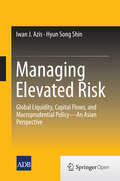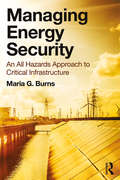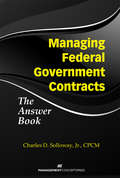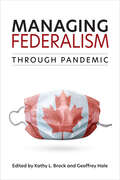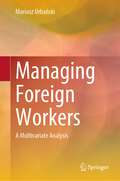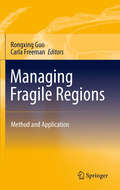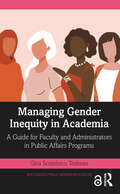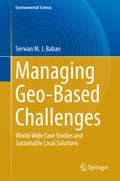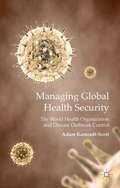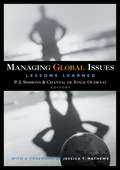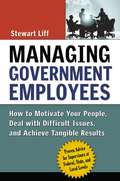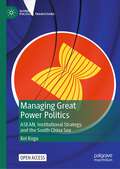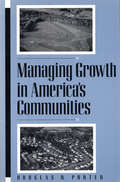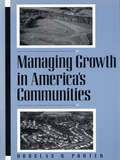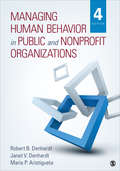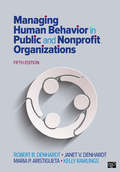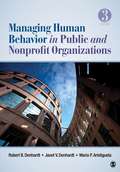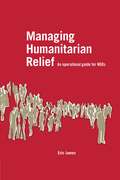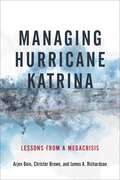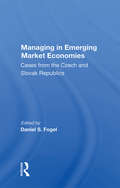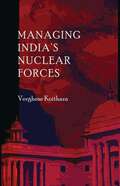- Table View
- List View
Managing Elevated Risk
by Hyun Song Shin Iwan J. AzisThis book discusses the risks and opportunities that arise in Emerging Asia given the context of a new environment in global liquidity and capital flows. It elaborates on the need to ensure financial and overall economic stability in the region through improved financial regulation and other policy measures to minimize the emergent risks. "Managing Elevated Risk: Global Liquidity, Capital Flows, and Macroprudential Policy--An Asian Perspective" also explores the range of policy options that may be deployed to address the impact of global liquidity on domestic financial and socio-economic conditions including income inequality. The book is primarily aimed at policy makers, financial market regulators and supervisory agencies to help them improve national regulatory systems and to promote harmonization of national regulations and practices in line with global standards. Scholars and researchers will also gain important information and knowledge about the overall impacts of changing global liquidity from the book.
Managing Energy Security: An All Hazards Approach to Critical Infrastructure
by Maria G. BurnsThis interdisciplinary book is written for government and industry professionals who need a comprehensive, accessible guide to modern energy security. Introducing the ten predominant energy types, both renewable and non-renewable, the book illustrates the modern energy landscape from a geopolitical, commercial, economic and technological perspective. Energy is presented as the powerhouse of global economic activities. To ensure the uninterrupted supply of energy, nations, industries and consumers need to have options. Efficient energy security planning ensures that when a primary energy source is depleted, compromised or interrupted, an alternative energy source must be readily available. For this reason, the foundations of energy security are built upon the five pillars of Sustainability, Independence, Efficiency, Affordability and Accessibility. The numerous case studies presented in this book demonstrate that energy security may be compromised in the absence of one out of these five ingredients. The book also entertains the Triple-E notion of Energy Efficiency, Environmental integrity and Economies of scale, used by governments and corporations for energy optimization. One of the key strengths of the book is its ability effectively to cover various scientific disciplines, and several energy types, while remaining comprehensible. This book will be of much interest to security or logistics professionals, economists and engineers, as well as policymakers.
Managing Federal Government Contracts: The Answer Book
by Charles D. Solloway Jr., CPCMYou've Got Questions – We've Got AnswersQuestions can arise at any point in the process of working with government contracts. Now, you have an accessible resource you can trust for authoritative answers.Managing Federal Government Contracts: The Answer Book covers the contract management process from planning to closeout and all the steps in between. Using the regulations and legislation as a basis, author Charles Solloway draws on his many years of experience to craft answers that will help you address the issues you face every day .This book provides answers to the questions most commonly asked by government program and contracting personnel, contracting officer's representatives, contractor employees, inspectors, and all those involved in government contract management. The question-and-answer format makes getting the information you need quick and efficient. Examples of forms and templates drawn from actual contract work are included to make your work easier. Along with the basics on the roles of the various contract team members and the different aspects associated with each contract type, this resource covers:• Partnering issues• Data use for efficient contract management• Remedial actions and how to properly initiate them• The government's role with subcontractorsDon't let your questions go unanswered. Get Managing Federal Government Contracts: The Answer Book.
Managing Federalism through Pandemic
by Geoffrey Hale Kathy L. BrockManaging Federalism through Pandemic summarizes and analyses multiple policy dimensions of Canada’s response to the COVID-19 pandemic and related policy issues from the perspective of Canadian federalism. Contributors address the relative effectiveness of intergovernmental cooperation at the summit level and in policy fields including emergency management, public health, national security, Indigenous Peoples and governments, border governance, crisis communications, fiscal federalism, income security policies (CERB), supply chain resilience, and interacting energy and climate policies. Despite serious policy failures of individual governments, repeated fluctuations in the overall effectiveness of pandemic management, and growing public frustration across provinces and regions, contributors show how processes for intergovernmental cooperation adapted reasonably well to the pandemic’s unprecedented stresses, particularly at the outset. The book concludes that, despite individual policy failures, Canada’s decentralized approach to policy management often enabled regional adaptation to varied conditions, helped to contain serious policy failures, and contributed to various degrees of policy learning across governments. Managing Federalism through Pandemic reveals how the pandemic exposed structural policy weaknesses which transcend federalism but have significant implications for how governments work together (or don’t) to promote the well-being of citizens.
Managing Foreign Workers: A Multivariate Analysis
by Mariusz UrbańskiThis book serves as an essential guide to understanding and effectively managing multiculturalism and diversity in the workplace. The book discusses the growing trend of hiring foreign workers by companies and the need to appropriately manage a diverse workforce. It addresses the research gap in the existing literature, which lacks detailed quantitative analyses on the employment of immigrants in business entities operating in Poland. By conducting an extensive survey of enterprises in Poland, the United Kingdom and the United Arab Emirates, the book provides a comprehensive analysis of managing employees in a multicultural work environment. It offers practical recommendations for improving employee motivation and performance while also contributing to the theory of management and quality sciences. This book is a valuable resource for anyone interested in managing a diverse workforce, and it provides a deeper understanding of the complex issues involved in managing foreign workers in a multicultural work environment.
Managing Fragile Regions
by Rongxing Guo Carla FreemanThis book gathers the work of leading scholars from several disciplines on fragile regions, especially those regions seeking to preserve, strengthen or create processes to restore or reestablish security and effective social and economic management. It tackles the multifarious issues that shape and affect fragile regions, drawing upon a wide range of intellectual and methodological approaches, including such fields as area studies, natural resource science, biology, environmental and resource economics and management, and political economy. The volume brings together the perspectives of a diverse group of contributors from Australia, China, Hong Kong, Indonesia, Japan, South Korea, and the United States. Managing Fragile Regions: Method and Application addresses a variety of factors - natural, political, administrative, legislative, economic, social, and cultural - and examines how they exert influences on the operational mechanisms of fragile regions, especially in the contexts of peace and security, economic development, and environmental management. The volume's nine chapters cover a wide range of examples of fragile regions and their challenges. It will be of interest and utility to practitioners and policy-makers engaged in disaster management and post-disaster reconstruction. Students, researchers, and other professionals involved in resource management, regional science, and environmental science will also find it valuable reading.
Managing Gender Inequity in Academia: A Guide for Faculty and Administrators in Public Affairs Programs (Routledge Public Affairs Education)
by Gina Scutelnicu TodoranAcademia is not immune to gender bias, and in many public affairs programs, inequities persist in faculty academic rank, salary, career length, job security, leadership roles, professional recognition, resource allocation, and role stereotypes. Managing Gender Inequity in Academia is the first book to provide an evidence-based guide for university administrators and faculty interested in building all-important gender equity in public affairs and related programs. Drawing on both secondary and primary data, the book offers a comprehensive perspective on public affairs faculty career paths, the obstacles to advancement in the academy, and how the COVID-19 pandemic further contributed to existing inequities.Each chapter of the book presents evidence-based research derived from interviews, surveys, existing statistics, and documents, offering guidance to public affairs programs, departments, and schools on ways to strengthen the recruitment, retention, and promotion of women in the academy. Ultimately, author Gina Scutelnicu Todoran demonstrates the ways in which gender equity can strengthen institutions of higher learning. Managing Gender Inequity in Academia is a guide for building gender equity in public affairs programs for faculty, higher education administrators, and graduate students in public affairs and related disciplines.Chapter 3 of this book is freely available as a downloadable Open Access PDF at http://www.taylorfrancis.com under a Creative Commons Attribution-Non Commercial-No Derivatives (CC-BY-NC-ND) 4.0 license.
Managing Geo-Based Challenges
by Serwan M. J. BabanThis book provides sound conceptual understanding of the current approach to management and decision making regarding geo-based challenges in developing countries that tend to suffer from information poverty and subjectivity and are reactive. The book also provides the necessary technical tools to energize research thinking and develop locally driven practical and sustainable solutions, ultimately moving management and decision making from being reactive to being proactive. This book fills a void as there are no published books to show the way forward or to present real case studies for this purpose. Case studies that utilize new technologies and scientific thinking are presented for developing sustainable management options based either on producing local applied research or on utilising relevant international research. These case studies are based on the author's first-hand experiences in arid/semi-arid (Iraq, Tunisia, Morocco and Jordan), temperate (UK) and tropical environments (Malaysia, the Caribbean region, Indonesia and Australia).
Managing Geographic Information Systems, Second Edition
by Jeffrey Pinto Nancy ObermeyerNow in a fully revised and expanded second edition, this widely adopted text and practical reference addresses all aspects of developing and using geographic information systems (GIS) within an organization. Coverage includes the role of the GIS professional, how geographic information fits into broader management information systems, the use of GIS in strategic planning, and ways to navigate the organizational processes that support or inhibit the success of GIS implementation. All chapters retained from the prior edition have been thoroughly updated to reflect significant technological, empirical, and conceptual advances, as well as the changing contexts of GIS use. New chapters discuss organizational politics, metadata, legal issues, and GIS ethics.
Managing Global Health Security
by Adam Kamradt-ScottThe author examines how the World Health Organization's approach to fulfilling its disease eradication mandate – now commonly described as 'global health security' – has changed and adapted over time. Drawing on constructivist and rationalist theories of international organization, as well as several case studies (malaria, smallpox, SARS, influenza, Ebola), the book explores how the organization's secretariat has exercised autonomy and authority to establish new customary practices and amend disease control policies and procedures in response to past failures and successes. Kamradt-Scott also investigates how the organization's member states have responded to these changes by imposing new constraints on the WHO's behaviour, and what these changes signal for the future.
Managing Global Issues
by P. J. Simmons Chantal De Oudraat Jessica T. MathewsGlobalization is pushing to the fore a wide variety of global problems that demand urgent policy attention. Managing Global Issues provides a comprehensive comparative assessment of international efforts to manage global problems. It identifies and explains successes and failures of such efforts, examines the roles of different actors, and outlines lessons that may guide future action by governments, international organizations, nongovernmental organizations, and the private sector. The volume's 16 case studies examine organized crime, drugs, corruption, human rights, labor rights, health, trade, financial markets, development assistance, the environment, the global commons, communications, weapons of mass destruction, conventional weapons, internal conflicts, and refugees. Managing Global Issues is the result of an international multidisciplinary research team composed of experts in specific global issue areas. The book's broad scope, numerous case studies and its rigorous comparative analytical framework offers a unique and valuable contribution to the rapidly growing literature on global governance. Contributors include Vinod K. Aggarwal (University of California, Berkeley), Thomas Bernauer (University of Zürich), William Drake (Carnegie Endowment), Octavio Gómez-Dantés (National Institute of Public Health, Mexico), Catherine Gwin (World Bank), Peter M. Haas (University of Massachusetts, Amherst), Christopher C. Joyner (Georgetown University), Brian Langille (University of Toronto), Robert E. Litan (Brookings Institution), Kathleen Newland (Carnegie Endowment), Peter Richardson (Transparency International), Peter H. Sand (Institute of International Law, Munich), Dinah L. Shelton (Notre Dame Law School), Timothy D. Sisk (University of Denver), Joanna Spear (King's College, London), and Phil Williams (University of Pittsburgh).
Managing Government Employees: How to Motivate Your People, Deal with Difficult Issues, and Achieve Tangible Results
by Stewart LiffManaging government employees presents unique challenges. Government managers may feel that stringent and convoluted regulations mean they "can't do that". Some others may use that perception as a crutch. But the truth for all of them is, yes, they can "do that" -- and they'd better. "That" means managing employees as proactively and decisively as their corporate counterparts, and holding their staffs, teams, and departments accountable for productivity and results. Managing Government Employees offers dozens of techniques for meeting the challenges and stressful situations supervisers face on a daily basis. Major topics include how to: * get maximum dedication and productivity from employees * improve results of poor performers and discipline or fire them when necessary * deal with union and EEO issues * cut through the red tape of government employment systems For managers frustrated by government bureaucracy, this book lets them know they have more power than they may think.
Managing Great Power Politics: ASEAN, Institutional Strategy, and the South China Sea (Global Political Transitions)
by Kei KogaThis Open Access book explains ASEAN’s strategic role in managing great power politics in East Asia. Constructing a theory of institutional strategy, this book argues that the regional security institutions in Southeast Asia, ASEAN and ASEAN-led institutions have devised their own institutional strategies vis-à-vis the South China Sea and navigated the great-power politics since the 1990s. ASEAN proliferated new security institutions in the 1990s and 2000s that assumed a different functionality, a different geopolitical scope, and thus a different institutional strategy. In so doing, ASEAN formed a “strategic institutional web” that nurtured a quasi-division of labor among the institutions to maintain relative stability in the South China Sea. Unlike the conventional analysis on ASEAN, this study disaggregates “ASEAN” as a collective regional actor into specific individual institutions—ASEAN Foreign Ministers’ Meeting, ASEAN Summit, ASEAN-China dialogues, ASEAN Regional Forum, East Asia Summit, and ASEAN Defense Ministers Meeting and ASEAN Defense Ministers Meeting-Plus—and explains how each of these institutions has devised and/or shifted its institutional strategy to curb great powers’ ambition in dominating the South China Sea while navigating great power competition. The book sheds light on the strategic potential and limitations of ASEAN and ASEAN-led security institutions, offers implications for the future role of ASEAN in the Indo-Pacific region, and provides an alternative understanding of the strategic utilities of regional security institutions.
Managing Growth in America's Communities: Second Edition
by Douglas R. PorterCommunities across the country are turning to the concept of "growth management" to help plan for the future, as they seek to control the location, impact, character and timing of development in order to balance environmental and economic needs and concerns. Managing Growth in America's Communities presents practical information about proven strategies, programs and techniques of growth management for urban and rural communities. Topics examined include: public roles in community development determining locations and character of future development protecting environmental and natural resources managing infrastructure development preserving community character and quality achieving economic and social goals property rights concerns The author describes regulatory and programmatic techniques that have been most useful, obstacles to be overcome, and specific strategies that have been instrumental in achieving successful growth management programs. He provides examples from dozens of communities across the country as well as state and regional approaches currently in use. Brief profiles present overviews of problems addressed, techniques implemented, outcomes, and contact information for conducting further research. Among the communities profiled are Arlington County, Virginia; Fort Collins, Colorado; Lexington-Fayette County, Kentucky; Lincoln, Nebraska; Sarasota, Florida; Raleigh, North Carolina; Scottsdale, Arizona; and numerous others. Also included in the volume are informational sidebars written by leading experts in growth management including Robert Yaro, John De Grove, David Brower, and others.Managing Growth in America's Communities is essential reading for community development specialists including government officials, planners, environmentalists, designers, developers, business people, and concerned citizens seeking innovative and feasible ways to manage growth.
Managing Growth in America's Communities: Second Edition
by Douglas R. PorterIn this thoroughly revised edition of Managing Growth in America's Communities, readers will learn the principles that guide intelligent planning for communities of any size, grasp the major issues in successfully managing growth, and discover what has actually worked in practice (and where and why). This clearly written book details how American communities have grappled with the challenges of planning for growth and the ways in which they are adapting new ideas about urban design, green building, and conservation. It describes the policies and programs they have implemented, and includes examples from towns and cities throughout the U.S.Growth management is essential today, as communities seek to control the location, impact, character, and timing of development in order to balance environmental and economic needs and concerns.The author, who is one of the nation's leading authorities on managing community growth, provides examples from dozens of communities across the country, as well as state and regional approaches. Brief profiles present overviews of specific problems addressed, techniques utilized, results achieved, and contact information for further research. Informative sidebars offer additional perspectives from experts in growth management, including Robert Lang, Arthur C. Nelson, Erik Meyers, and others.In particular, he considers issues of population growth, eminent domain, and the importance of design, especially green design. He also reports on the latest ideas in sustainable development, smart growth, neighborhood design, transit-oriented development, and green infrastructure planning. Like its predecessor, the second edition of Managing Growth in America's Communities is essential reading for anyone who is interested in how communities can grow intelligently.
Managing Human Behavior in Public and Nonprofit Organizations
by Robert B. Denhardt Janet V. Denhardt Dr Maria P. AristiguetaA must-read for students in public administration and nonprofit management programs! Managing Human Behavior in Public and Nonprofit Organizations, Fourth Edition, is designed to help students understand, manage, and influence the behavior of others in the workplace. Esteemed authors Robert B. Denhardt, Janet V. Denhardt, and Maria P. Aristigueta take an action-oriented approach by using real-world circumstances within public and nonprofit organizations to illustrate key concepts. Important topics such as stress, decision making, motivation, leadership, communication, teams, and change give students a foundational understanding of the basic issues that affect human behavior. In addition to new cases and examples from the public and nonprofit sectors, the Fourth Edition features new material on leadership and organizational change, cultural diversity and generational diversity, and positive organizational behavior.
Managing Human Behavior in Public and Nonprofit Organizations
by Robert B. Denhardt Janet V. Denhardt Dr Maria P. AristiguetaA must-read for students in public administration and nonprofit management programs! Managing Human Behavior in Public and Nonprofit Organizations, Fourth Edition, is designed to help students understand, manage, and influence the behavior of others in the workplace. Esteemed authors Robert B. Denhardt, Janet V. Denhardt, and Maria P. Aristigueta take an action-oriented approach by using real-world circumstances within public and nonprofit organizations to illustrate key concepts. Important topics such as stress, decision making, motivation, leadership, communication, teams, and change give students a foundational understanding of the basic issues that affect human behavior. In addition to new cases and examples from the public and nonprofit sectors, the Fourth Edition features new material on leadership and organizational change, cultural diversity and generational diversity, and positive organizational behavior.
Managing Human Behavior in Public and Nonprofit Organizations
by Robert B. Denhardt Janet V. Denhardt Dr Maria P. Aristigueta Kelly C. RawlingsManaging Human Behavior in Public and Nonprofit Organizations, Fifth Edition is an established core text designed to help you develop your leadership and management skills. Bestselling authors Denhardt, Denhardt, Aristigueta, and Rawlings cover important topics such as stress, decision-making, motivation, leadership, teams, communication, and change. Cases, self-assessment exercises, and numerous examples provide you with the opportunity to apply concepts and theories discussed in the chapter. Focusing exclusively on organizational behavior in both public and nonprofit organizations, this text is a must-read for students in public administration programs. New to the Fifth Edition: Increased attention to issues related to nonprofit organizations helps you develop a better understanding of the differences and similarities in public and nonprofit organizations, as well as the way they interact with one another and with the private sector. Broadened coverage of issues related to ethics and diversity offers you a broader perspective on important issues to consider, such as the examination of implicit and explicit bias, generational differences, and power and privilege. Additional discussions of collaboration, inclusion, and participation, both within the organization and with external constituencies, show you the value rationale for engagement and its practical effects. Revised and updated information on emerging technology illustrates to you how an increasingly digital, connected, and networked environment affects our ability to manage public and nonprofit organizations. New cases, examples, self-assessments, and exercises cover recent developments in research and practice to offer relevant ways for you to practice and improve your management skills.
Managing Human Behavior in Public and Nonprofit Organizations
by Robert B. Denhardt Janet V. Denhardt Dr Maria P. Aristigueta Kelly C. RawlingsManaging Human Behavior in Public and Nonprofit Organizations, Fifth Edition is an established core text designed to help you develop your leadership and management skills. Bestselling authors Denhardt, Denhardt, Aristigueta, and Rawlings cover important topics such as stress, decision-making, motivation, leadership, teams, communication, and change. Cases, self-assessment exercises, and numerous examples provide you with the opportunity to apply concepts and theories discussed in the chapter. Focusing exclusively on organizational behavior in both public and nonprofit organizations, this text is a must-read for students in public administration programs. New to the Fifth Edition: Increased attention to issues related to nonprofit organizations helps you develop a better understanding of the differences and similarities in public and nonprofit organizations, as well as the way they interact with one another and with the private sector. Broadened coverage of issues related to ethics and diversity offers you a broader perspective on important issues to consider, such as the examination of implicit and explicit bias, generational differences, and power and privilege. Additional discussions of collaboration, inclusion, and participation, both within the organization and with external constituencies, show you the value rationale for engagement and its practical effects. Revised and updated information on emerging technology illustrates to you how an increasingly digital, connected, and networked environment affects our ability to manage public and nonprofit organizations. New cases, examples, self-assessments, and exercises cover recent developments in research and practice to offer relevant ways for you to practice and improve your management skills.
Managing Human Behavior in Public and Nonprofit Organizations
by Robert B. Denhardt Janet V. Denhardt Maria P. AristiguetaThe only text in management and organizational behavior to focus on public organizations, nonprofit organizations, and school systems, Managing Human Behavior in Public and Nonprofit Organizations fosters competency in critical management and leadership skills including communication, motivation, teamwork, group dynamics, and decision-making. Cases, self-assessment exercises, simulations, and evaluative instruments provide students the opportunity to experience the applied side of theories and to learn both cognitively and experientially. The Third Edition covers recent developments in the field including the emergence of "positive organizational behavior. "
Managing Humanitarian Relief: An Operational Guide for NGOs
by Eric JamesResponding effectively to humanitarian disasters is far from straightforward, and relief workers often find themselves working in competitive situations or at cross purposes with other agencies. Managing Humanitarian Relief is aimed at relief workers charged with putting together a program of action to help people in extreme crisis. It provides humanitarian relief managers with a single comprehensive reference for all the management issues they are likely to encounter in the field. The book is organized in two parts. First, it provides an outline of different relief programming sectors: food and nutrition, health, water and sanitation, and shelter. Second, it presents 20 separate management topics that are essential for overseeing programs. Its easy-to-use format includes checklists, tables, diagrams, sample forms, and no-nonsense tips from practitioners to help readers in emergency situations.
Managing Hurricane Katrina: Lessons from a Megacrisis
by Arjen Boin Christer Brown Professor James A. RichardsonThe government’s response to Hurricane Katrina, one of the most devastating natural disasters in U.S. history, suffered numerous criticisms. Nearly every assessment pointed to failure, from evaluations of President George W. Bush, FEMA, and the Department of Homeland Security to the state of Louisiana and the city administration of New Orleans. In Managing Hurricane Katrina: Lessons from a Megacrisis, Arjen Boin, Christer Brown, and James A. Richardson deliver a more nuanced examination of the storm’s aftermath than the ones anchored in public memory, and identify aspects of management that offer more positive examples of leadership than bureaucratic and media reports indicated. Katrina may be the most extensively studied disaster to date, but the authors argue that many academic conclusions are inaccurate or contradictory when examined in concert. Drawing on insights from crisis and disaster management studies, Boin, Brown, and Richardson apply a clear framework to objectively analyze the actions of various officials and organizations during and after Katrina. They specify critical factors that determine the successes and failures of a societal response to catastrophes and demonstrate how to utilize their framework in future superdisasters. Going beyond previous assessments, Managing Hurricane Katrina reconsiders the role of government in both preparing for a megacrisis and building an effective response network at a time when citizens need it most.
Managing In Emerging Market Economies: Cases From The Czech And Slovak Republics
by Daniel S FogelSince 1989, east-central Europe has plunged headlong into reform efforts, and firms large and small have been forced almost overnight to adapt to the demands of a market economy. This book of case studies on business development in the Czech and Slovak Republics illustrates how various industries and specific companies are responding to the challen
Managing India's Nuclear Forces
by Verghese KoitharaIndia is now enmeshed in the deterrence game--actively with its traditional adversary Pakistan, and potentially with China. At the same time it is finding easier access to fissile materials and strategic technologies. In order to deal with these developments safely and wisely, the nation needs a much more sophisticated and multidisciplinary understanding of the strategic, technological, operational, and cost issues involved in nuclear matters.In this important book, Indian strategic analyst Verghese Koithara explains and evaluates India's nuclear force management, encouraging a broad public conversation that may act as a catalyst for positive change before the subcontinent experiences unthinkable carnage. The defense management system of a nuclear power absolutely needs to be sound and thorough. In addition to the considerable demands of managing its nuclear forces, it also must control conventional forces in a manner that forestalls nuclear escalation of a conflict by either side. Expanding and upgrading nuclear forces without enhancing deterrence is dangerous and should be avoided. India's nuclear force management system is grafted onto a woefully inadequate overall system of defense management.Koithara dissects all of these issues and suggests a way forward, drawing on recent developments in deterrence theory around the world.
Managing India's Nuclear Forces
by Verghese KoitharaIndia is now enmeshed in the deterrence game-actively with its traditional adversary Pakistan, and potentially with China. At the same time it is finding easier access to fissile materials and strategic technologies. In order to deal with these developments safely and wisely, the nation needs a much more sophisticated and multidisciplinary understanding of the strategic, technological, operational, and cost issues involved in nuclear matters.In this important book, Indian strategic analyst Verghese Koithara explains and evaluates India's nuclear force management, encouraging a broad public conversation that may act as a catalyst for positive change before the subcontinent experiences unthinkable carnage.The defense management system of a nuclear power absolutely needs to be sound and thorough. In addition to the considerable demands of managing its nuclear forces, it also must control conventional forces in a manner that forestalls nuclear escalation of a conflict by either side. Expanding and upgrading nuclear forces without enhancing deterrence is dangerous and should be avoided. India's nuclear force management system is grafted onto a woefully inadequate overall system of defense management.Koithara dissects all of these issues and suggests a way forward, drawing on recent developments in deterrence theory around the world.
